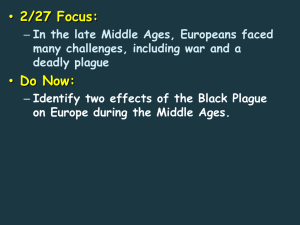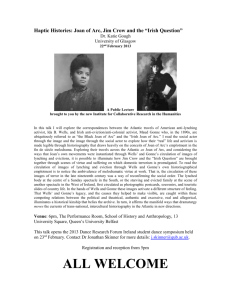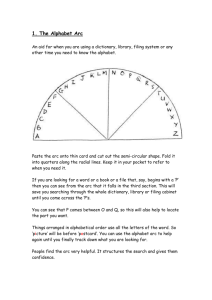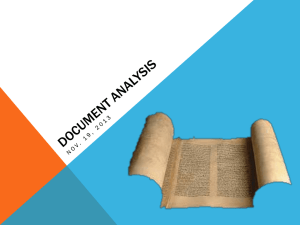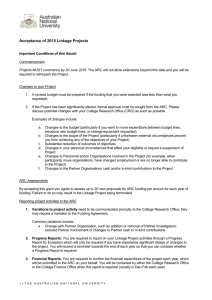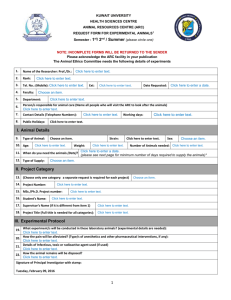contemporary commentators on joan of arc
advertisement
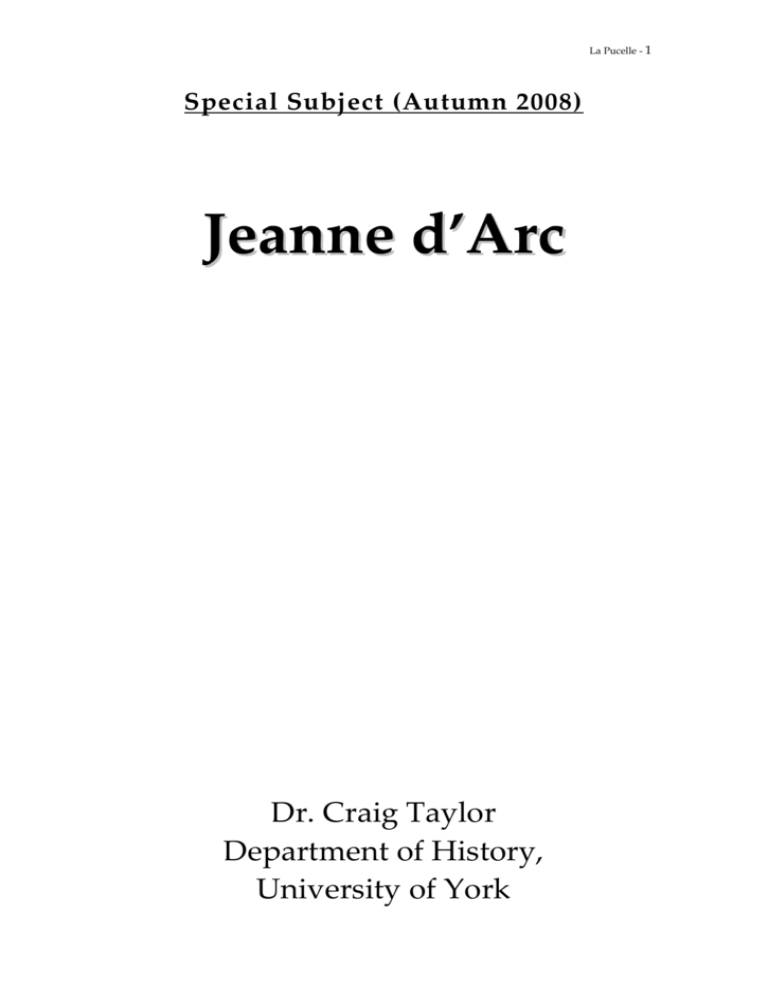
La Pucelle - 1 Special Subject (Autumn 2008) Jeanne d’Arc Dr. Craig Taylor Department of History, University of York La Pucelle - 2 Introduction Joan of Arc was born in 1412 and grew up during a time of civil war and invasion. At the age of just seventeen, she rode into battle to unite France against English domination in the Hundred Years War and in 1431, aged only nineteen, she was put on trial for heresy and sorcery by an ecclesiastical court of the Inquisition and was burned at the stake. Her story represents a virtually unique confluence of some of the key themes of medieval history: Joan had an extraordinary impact upon the military and political situation in both fifteenthcentury France and England, arguably turning the tide of the Hundred Years War in favour of Charles VII. The fact that she achieved all of this as a mere peasant girl amplifies the magnitude of her achievements but also opens up other ways of looking at her story: her trial for heresy provides an important window into contemporary attitudes towards religion and gender, as Joan was effectively persecuted by the established Church for her supposedly nonconformist views on spirituality and the role of women. This special subject will open up this wide-ranging story to students, enabling them to investigate the life and contemporary reputation of Joan of Arc within a contextual and critical framework. Preliminary reading To prepare for this course, I would recommend looking at some of the following items of secondary reading: Allmand, C.T. The Hundred Years War. Revised edition, Cambridge, 2001. DeVries, K. Joan of Arc. A military leader. Stroud, 1999. Pernoud, Régine and Marie-Véronique Clin. Joan of Arc: her story. New York, 1998. Pernoud, Régine. Joan of Arc by herself and her witnesses. New York, 1968. Vale, M.G.A. Charles VII. London, 1974. (background on the reign of Charles VII) Warner, Marina. Joan of Arc: the image of female heroism. London, 1981. In addition, all students will need a copy of the sourcebook for the special subject, Joan of Arc, La Pucelle. Ed. and trans. Craig Taylor. Manchester, 2006. ISBN 0719068479. La Pucelle - 3 Teaching Programme: The course will be taught by two 2 hour seminars per week over nine weeks. In the first two weeks of the course, we will set the stage by exploring the historical and political context for the story of Joan of Arc, reviewing the most famous biographies, and considering contemporary views of heresy and gender. In the remainder of the course, we will turn to the primary sources themselves, reading them in chronological order. We start with contemporary letters, chronicles and literature, and then move on the extensive trial records in order to understand the inquisitorial strategies employed to attack and then defend Joan of Arc, evaluating the value of these records for historians. Student will take it in turns to lead discussion of particular sources. Week 2. 3. 4. 5. 6. 7. 8. 9. 10. Seminar one Military and political background Visionaries and heretics Debating Joan, 1429-1431 Rouen Trial interrogations Rouen Trial interrogations Rouen trial judgements Debating Joan, 1431-1450 Nullification trial Nullification trial Seminar two Historians & Joan of Arc Heresy and Inquisition Debating Joan, 1429-1431 Rouen trial interrogations Rouen trial charges Debating Joan, 1431-1450 Preliminary Nullification inquiries Nullification trial The legacy of Joan La Pucelle - 4 BIBLIOGRAPHY BIOGRAPHIES OF JOAN OF ARC ................................................................................................... 5 HISTORICAL AND POLITICAL CONTEXT ................................................................................... 6 JOAN’S MILITARY CAREER ..................................................................................................................... 7 SPIRITUALITY, GENDER AND HERESY ....................................................................................... 8 HERESY AND INQUISITION ..................................................................................................................... 8 GENERAL STUDIES OF JOAN OF ARC ...................................................................................................... 9 VIRGINITY AND MAIDENHOOD ............................................................................................................... 9 VISIONARIES, HOLY WOMEN AND SAINTS ............................................................................................ 10 PROPHECY ........................................................................................................................................... 11 CLOTHING AND WEAPONS .................................................................................................................... 11 WITCHCRAFT AND POPULAR RELIGION ................................................................................................ 11 MISCELLANEOUS ................................................................................................................................. 12 CONTEMPORARY COMMENTATORS ON JOAN OF ARC ...................................................... 13 FRENCH WRITINGS ............................................................................................................................... 13 TRACTS ATTRIBUTED TO JEAN GERSON ............................................................................................... 13 CHRISTINE DE PIZAN............................................................................................................................ 13 ALAIN CHARTIER ................................................................................................................................. 14 MARTIN LE FRANC .............................................................................................................................. 14 CHRONICLERS ...................................................................................................................................... 14 INTERNATIONAL OPINION .................................................................................................................... 15 THE TRIALS OF JOAN ..................................................................................................................... 16 THE ROUEN TRIAL ............................................................................................................................... 16 THE NULLIFICATION TRIAL .................................................................................................................. 17 La Pucelle - 5 BIOGRAPHIES OF JOAN OF ARC Beaune, Colette. Jeanne d’Arc. Paris, 2004. Gies, Frances. Joan of Arc: the legend and the reality. New York, 1981. Lea, H.C. ‘Political heresy utilized by the state: Joan of Arc’ The history of the Inqusition of the middle ages. 3 volumes. London, 1887, reprinted 1958. III, 338-78. Lightbody, Charles Wayland. The judgements of Joan. Joan of Arc, a study in cultural history. London, 1961. Lucie-Smith, Edward. Joan of Arc. London, 1976. Margolis, Nadia. ‘Joan of Arc’ Cambridge companion to medieval women’s writings. Ed. Carolyn Dinshaw and David Wallace. Cambridge, 2003. 256-66. Pernoud, Régine. Joan of Arc by herself and her witnesses. Trans. Edward Hyams. London, 1964. Pernoud, Régine and Marie-Véronique Clin. Joan of Arc: her story. Revised and translated by Jeremy Duquesnay Adams. New York, 1998. Richey, Stephen W. Joan of Arc, the warrior saint. Westport, CT, 2003. Scott, W.S. Jeanne d’Arc. Her life, death and the myth. London, 1974. Warner, Marina. Joan of Arc: the image of female heroism. London, 1981. Wood, Charles T. Joan of Arc and Richard III: Sex, Saints and Government in the Middle Ages. Oxford, 1988. 119-51. La Pucelle - 6 HISTORICAL AND POLITICAL CONTEXT Allmand, Christopher T. The Hundred Years War. Cambridge, 1988. Allmand, Christopher T. Lancastrian Normandy, 1415-1450: the history of a medieval occupation. Oxford, 1983. Blockmans, Wim and Prevenier, Walter. ‘The decisive years, 1425-1440’ Promised lands. The Low Countries under Burgundian ruile, 1369-1530. Philadelphia, 1999. Chapter 4. Butler, Raymond Reagan. Is Paris lost? The English occupation, 1422-1436. Staplehurst, 2003. Curry, Anne. ‘The ‘Coronation expedition’ and Henry VI’s court in France, 1430 to 1432’ The Lancastrian court. Proceedings of the 2001 Harlaxton symposium. Ed. Jenny Stratford. Donington, 2003. 29-52. Curry, Anne. ‘The ‘Coronation expedition’ and Henry VI’s court in France, 1430 to 1432’ The Lancastrian court. Proceedings of the 2001 Harlaxton symposium. Ed. Jenny Stratford. Donington, 2003. 29-52. Curry, Anne. ‘The first English standing army? Military organisation in Lancastrian Normandy, 1420-1450’ Patronage, pedigree and power in later medieval England. Ed. C.D. Ross. Gloucester, 1979. 193-214. Curry, Anne. ‘The nationality of men-at-arms serving in English armies in Normandy and the pays de conquête, 1415-1450: a preliminary study’ Reading medieval studies, 18 (1992). 135-63. Curry, Anne. The Hundred Years War. Revised edition, Basingstoke, 2003. Famiglietti, Richard C. Royal intrigue: crisis at the court of Charles VI, 1392-1420. New York, 1986. Harriss, G.L. Cardinal Beaufort. A study of Lancastrian ascendancy and decline. Oxford, 1988. Harriss, Gerald. ‘The English in France, 1413-1453’ Shaping the nation. England, 1360-1461. Oxford, 2005. 540-87. Housley, Norman. ‘Pro deo et patria mori: sanctified patriotism in Europe, 1400-1600’ War and competition between states. Ed. P. Contamine. Oxford, 2000. 221-48. Housley, Norman. Religious warfare in Europe, 1400-1536. Oxford, 2002. Jones, M.K. ‘’Gardez mon corps, sauvez ma terre’. Immunity from war and the lands of a captive knight: the siege of Orléans (1428-1429) revisited’ Charles d’Orléans in England (1415-1440). Ed. Mary-Jo Arn. Cambridge, 2000. 9-26. Lewis, P.S. Essays in later medieval French history. London, 1985. Lewis, P.S. Later medieval France: the polity. London, 1968. Little, Roger G. ‘The Parlement, the seige of Orléans and Joan of Arc (c. 1429-1431)’ The Parlement of Poitiers: war, government and politics in France, 1418-1436. London, 1984. 90-123. Perroy, Edouard. The Hundred Years War. Trans. W.B. Wells. London, 1951. Parts IV and V (esp. pp. 282-9). Pollard, A.J. John Talbot and the war in France, 1427-1453. London, 1983. Thompson, Guy Llewelyn. Paris and its people under English rule. The Anglo-Burgundian regime 1420-1436. Oxford, 1991. Vale, M.G.A. ‘France at the end of the Hundred Years War (c.1420-1461)’ The new Cambridge medieval history, VII: c.1415-c.1500. Ed. C.T. Allmand. Cambridge, 1998. 392-407. Vale, M.G.A. ‘The King and Joan of Arc, 1429-1456’ Charles VII. London, 1974. Chapter 3. Vaughan, Richard. Philip the Good. The apogée of the Burgundian state. Harlow, 1970. Vaughan, Richard. Valois Burgundy. London, 1975. Verger, Jacques. ‘The University of Paris at the end of the Hundred Years War’ Universities in poltics: case studies from the late middle ages and early modern periods. Ed. J.W. Baldwin and R. Goldthwaithe. Baltimore, 1972. 47-78. La Pucelle - 7 Warner, Mark. ‘The Anglo-French dual monarchy and the house of Burgundy, 1420-1435: the survival of an alliance’ French history, 11 (1997). 103-30. Joan’s military career DeVries, Kelly. ‘The use of gunpowder weaponry by and against Joan of Arc during the Hundred Years War’ War and society, 14 (1996). 1-15. Reprinted in Guns and men in medieval Europe, 1200-1500: studies in military history and technology. Aldershot, 2002. DeVries, Kelly. Joan of Arc. A military leader. Stroud, 1999. DeVries, Kelly. ‘A woman as leader of men: Joan of Arc’s military career’ Fresh verdicts on Joan of Arc. Ed. B. Wheeler and C.T. Wood. New York, 1996. 3-18. Reprinted in Guns and men in medieval Europe, 1200-1500: studies in military history and technology. Aldershot, 2002. Chapter 6. DeVries, Kelly. ‘Joan of Arc’s call to crusade’ Joan of Arc and spirituality. Ed. Ann W. Astell and Bonnie Wheeler. Basingstoke, 2003. 111-26. DeVries, Kelly. ‘Teenagers at war during the middle ages’ The premodern teenager. Youth in society, 1150-1650. Ed. Konrad Eisenbichler. Toronto, 2002. 207-23. Fraikin, J. ‘Was Joan of Arc a “sign” of Charles VII’s innocence?’ Fresh verdicts on Joan of Arc. Ed. B. Wheeler and C.T. Wood. New York, 1996. 61-72. [not very clear!!] Jones, M.K. ‘’Gardez mon corps, sauvez ma terre’. Immunity from war and the lands of a captive knight: the siege of Orléans (1428-1429) revisited’ Charles d’Orléans in England (1415-1440). Ed. Mary-Jo Arn. Cambridge, 2000. 9-26. Le Goff, Jacques. ‘Reims, city of coronation’ Realms of memory: the construction of the French past. III: Symbols. Ed. Pierre Nora and trans. Arthur Goldhammer. New York, 1996-8. III, 193-252. [translation of ‘Reims, ville sacre’ Les lieux de mémoire. II, La Nation. Ed. Pierre Nora. Paris, 1986. 89-194] Little, Roger G. ‘The Parlement, the seige of Orléans and Joan of Arc (c. 1429-1431)’ The Parlement of Poitiers: war, government and politics in France, 1418-1436. London, 1984. 90-123. Nicolle, David. Orléans 1429. France turns the tide. Oxford, 2001. Pernoud, Régine and Marie-Véronique Clin. Joan of Arc: her story. Revised and translated by Jeremy Duquesnay Adams. New York, 1998. Pinzino, Jane Marie. ‘Just war, Joan of Arc and the politics of salvation’ The Hundred Years War: a wider focus. Ed. Andrew J. Villalon and Donald Kagay. Leiden, 2005. 365-96. Pollard, A.J. John Talbot and the war in France, 1427-1453. London, 1983. Chapters 1-2. Thompson, Guy Llewelyn. ‘Defence and security’ Paris and its people under English rule. The Anglo-Burgundian regime 1420-1436. Oxford, 1991. Chapter 4. Vauchez, André. ‘Joan of Arc and female prophecy in the fourteenth and fifteenth centuries’ Laity in the middle ages. Religious beliefs and devotional practices. Ed. D.E. Bornstein and trans. M.J. Schneider. Nortre Dame, IN, 1993. 255-64. Wood, C.T. ‘Joan of Arc’s mission and the lost record of her interrogation at Poitiers’ Fresh verdicts on Joan of Arc. Ed. B. Wheeler and C.T. Wood. New York, 1996. 19-30. La Pucelle - 8 SPIRITUALITY, GENDER AND HERESY Heresy and Inquisition Arnold, John. Inquisition and power: Catharism and the confessing subject in Medieval Languedoc. Philadelphia, 2001. Arnold, John H. Belief and unbelief in medieval Europe. London, 2005. Aston, M. ‘Lollardy and sedition, 1381-1431’ Lollards and reformers: images and literacy in late medieval religion. London, 1984. 1-47. Bartlett, Robert. The hanged man. A story of miracle, memory and colonialism in the middle ages. Princeton, 2004. Biller, Peter. ‘Through a glass darkly : seeing medieval heresy’ The medieval world. Ed. Peter Linehan and Janet L. Nelson. London, 2001. 308-26. Elliott, Dyan. Proving woman. Female spirituality and Inquisitional culture in the later middle ages. Princeton, 2004. Forrest, Ian. The detection of heresy in late medieval England. Oxford, 2005. Friedlander, Alan. The Hammer of the Inquisitors. Brother Bernard Délicieux and the struggle against the Inquisition in fourteenth-century France. Turnhout, 2000. Hamilton, Bernard. The medieval inquisition. New York, 1981. Justice, Steven. ‘Lollardy’ Cambridge history of medieval English literature. Ed. D. Wallace. Cambridge, 1999. 662-89. Kieckhefer, Richard. ‘The office of inquisitor and medieval heresy: the transition from a personal to an institutional jurisdiction’ Journal of Ecclesiastical History, 46 (1995). 3691. Klassen, John. ‘Hus, the Hussites and Bohemia’ The new Cambridge medieval history, VII: c.1415c.1500. Ed. C.T. Allmand. Cambridge, 1998. 367-391. Lambert, M. Medieval heresy: popular movements from the Gregorian reform to the Reformation. 3rd edition, Oxford, 2002. Lea, H.C. The Inquisition of the middle ages: its organization and operation. London, 1963. [reprint of chapters 7-14 of The history of the Inqusition of the middle ages. Volume I.] Rex, Richard. The Lollards. Basingstoke, 1999. Barber, Malcolm. The Cathars: Dualist heretics in Languedoc in the high middle ages. Harlow, 2000. Biller, Peter. The Waldenses, 1170-1530: between a religious order and a church. Aldershot, 2000. Biller, Peter. ‘The earliest Heretical Englishwomen’ Medieval women: texts and contexts in late medieval Britain. Essays for Felicity Riddy. Ed. Jocelyn Wogan-Browne et.al. Turnhout, 2000. 363-76. Brundage, M. Medieval Canon Law. London, 1995. Given, James B. Inquisition and medieval society: power, discipline and resistance in Languedoc. Ithaca, N.Y, 1997. Hamilton, Bernard. The Medieval Inquisition. London, 1981. Leff, Gordon. Heresy in the later middle ages. The relation of heterodoxy to dissent, c.1250-c.1450. 2 vols. Manchester, 1967. Lerner, R. The heresy of the free spirit in the later middle ages, Berkeley, 1972. Patschovsky, A. ‘Heresy and society. On the political function of heresy in the medieval world’ Texts and the repression of medieval heresy. Ed. Peter Biller and Caterina Bruschi. Woodbridge, 2002. 23-41. Wakefield, W.L. Heresy, Crusade and Inquisition in Southern France 1100-1250. London, 1974. Wakefield, W.L. ‘Some unorthodox popular ideas of the thirteenth century’ Medievalia et Humanistica, new series 4 (1973). 23-35. La Pucelle - 9 General studies of Joan of Arc Barstow, A.L. Joan of Arc: heretic, mystic, shaman. Lewiston, 1986. Blythe, James M. ‘Women in the military: Scholastic arguments and medieval images of female warriors’ History of political thought, 22 (2001), 242-269. Boyd, Beverly. ‘Wyclif, Joan of Arc and Margery Kempe’ Mystics quarterly, 12 (1986). 112-118. Edwards, Lilas G. ‘Joan of Arc: gender and authority in the text of the Trial of Condemnation’ Young Medieval Women. Ed. Katherine J. Lewis, Noël Menuge and Kim M. Phillips. Stroud, 1999. 133-152. Fraioli, Deborah. ‘Why Joan of Arc never became an Amazon’ Fresh verdicts on Joan of Arc. Ed. B. Wheeler and C.T. Wood. New York, 1996. 189-204. Fraioli, Deborah. Joan of Arc: the early debate. Woodbridge, 2000. Hamilton, Bernard. Religion in the medieval West. 2nd edition, London, 2003. Hay, David. ‘Canon laws regarding female military commanders up to the time of Gratian : some texts and their historical contexts’ A great effusion of blood? Interpreting medieval violence. Ed. Mark D. Meyerson, Daniel Thiery and Oren Falk. Toronto, 2004. 287-313. Little, L.K. and Rosenwein, B.H. ‘Gender’ Debating the middle ages: issues and readings. Ed. L.K. Little and B.H. Rosenwein. Oxford, 1998. 211-18. Rapp, Francis. ‘Religious belief and practice’ The new Cambridge medieval history, VII: c.1415c.1500. Ed. C.T. Allmand. Cambridge, 1998. 205-19. Rigby, S.H. ‘Gender as social closure: women’ English society in the later middle ages. London, 1995. 243-83. Schmitt, Jean-Claude. ‘Religion, folklore and society in the medieval West’ Debating the middle ages: issues and readings. Ed. L.K. Little and B.H. Rosenwein. Oxford, 1998. 376-87. Scott, Joan Wallach. Gender and the politics of history. Revised edition, Columbia, 1999. Swanson, R.N. Religion and devotion in Europe, c. 1215- c.1550. Cambridge, 1995. Warner, Marina. ‘Joan of Arc: a gender myth’ Joan of Arc: reality and myth. Ed. Jan van Herwaarden. Hilversum, 1994. 97-117. Virginity and maidenhood Bernau, Anke. ‘A Christian corpus: virginity, violence and knowledge in the Life of St. Katherine of Alexandria’ St. Katherine of Alexandria: texts and contexts in Western Medieval Europe. Ed. Jacqueline Jenkins and Katherine J. Lewis. Turnhout, 2003.10930. Jenkins, Jacqueline and Lewis, Katherine J. ‘Introduction’ St. Katherine of Alexandria: texts and contexts in western medieval Europe. Ed. Jacqueline Jenkins and Katherine J. Lewis. Turnhout, 1-18. Lewis, Katherine J. ‘Model girls? Virgin-martyrs and the training of young women in late medieval England’ Young Medieval Women. Ed. Katherine J. Lewis, Noël Menuge and Kim M. Phillips. Stroud, 1999. 25-46. McInerney, Maud Bennett. ‘The queerest fish: Saint Joan’ Eloquent virgins from Thecla to Joan of Arc. The rhetoric of virginity from Thecla to Joan of Arc. Basingstoke, 2003. 195-211. Phillips, Kim M. ‘Maidenhood as the perfect age of woman’s life’ Young Medieval Women. Ed. Katherine J. Lewis, Noël Menuge and Kim M. Phillips. Stroud, 1999. 1-24. Phillips, Kim M. ‘Desiring virgins: maidens, martyrs and femininity in late medieval England’ Youth in the middle ages. Ed. P.J.P. Goldberg and F.J. Riddy. York, 2004. 45-59. Phillips, Kim M. Medieval maidens: young women and gender in England, 1270-1540. Manchester, 2003. La Pucelle - 10 Salih, Sarah; Bernau, Anke and Evans Ruth. ‘Introduction: virginities and virginity studies’ Medieval viriginities. Ed. Anke Bernau, Sarah Salih and Ruth Evans. Toronto, 2003. 113. Salih, Sarah. Versions of virginity in late medieval England. Cambridge 2001. Stoertz, Fiona Harris. ‘Young women in France and England, 1050-1300’ Journal of women's history, 12 (2001). 22-46. Wogan-Browne, Jocelyn. ‘Virginity now and then : a response to Medieval Virginities’ Medieval viriginities. Ed. Anke Bernau, Sarah Salih and Ruth Evans. Toronto, 2003. 234-53. Atkinson, C.W., ‘Precious balm in a fragile glass: the ideology of virginity in the later Middle Ages’ Journal of family history, 8 (1983). 131-43. Visionaries, holy women and saints Astell, Ann W. ‘The Virgin Mary and the ‘voices’ of Joan of Arc’ Joan of Arc and spirituality. Ed. Ann W. Astell and Bonnie Wheeler. Basingstoke, 2003. 37-60. Blumenfeld-Kosinski, Renate. ‘Constance de Rabastens: politics and visionary experience in the time of the Great Schism’ Mystics quarterly, 25 (1999). 147-68. Blumenfeld-Kosinski, Renate. Poets, saints and visionaries of the Great Schism, 1378-1417. University Park, 2006. Caciola, Nancy. ‘Mystics, demoniacs and the physiology of spirit possession in medieval Europe’ Comparative Studies in Society and History, 42 (2000). 268-306. Caciola, Nancy. Discerning spirits: divine and demonic possession in the middle ages. Ithaca, 2003. Elliott, Dyan. ‘Seeing double: Jean Gerson, the discernment of spirits, and Joan of Arc’ American Historical Review, 107 (2001). 26-54. Elliott, Dyan. ‘John Gerson and Joan of Arc’ Proving woman. Female spirituality and Inquisitional culture in the later middle ages. Princeton, 2004. 264-96. Kieckhefer, Richard. ‘The holy and the unholy: sainthood, witchcraft and magic in late medieval Europe’ Journal of Medieval and Renaissance Studies, 26 (1994). 355-87. Lagorio, Valerie. ‘The continental women mystics of the middle ages: an assessment’ The roots of the modern Christian tradition. Ed. E.R. Elder. Kalamazoo, 1984. Sullivan, Karen. ‘”I do not name to you the voice of St. Michael”: the identification of Joan of Arc’s voices’ Fresh verdicts on Joan of Arc. Ed. B. Wheeler and C.T. Wood. New York, 1996. 85-112. Vauchez, André. ‘A holy woman during the Hundred Years War: Jeanne-Marie of Maillé’ Laity in the middle ages. Religious beliefs and devotional practices. Ed. D.E. Bornstein and trans. M.J. Schneider. Nortre Dame, IN, 1993. 205-15. Vauchez, André. ‘Joan of Arc and female prophecy in the fourteenth and fifteenth centuries’ Laity in the middle ages. Religious beliefs and devotional practices. Ed. D.E. Bornstein and trans. M.J. Schneider. Notre Dame, IN, 1993. 255-64. Vauchez, André. Sainthood in the Later Middle Ages. Trans. Jean Birrell. Cambridge, 1997. Voaden, R. God’s words, women’s voices. The discernment of spirits in the writing of late-medieval visionaries. Woodbridge, 1999. Voaden, Rosalynn and Volf, Stephanie. ‘Visions of my youth. Representations of the childhood of medieval visionaries’ Gender and history, 12 (2000). 665-84. Winstead, Karen A. ‘St. Katherine’s hair’ St. Katherine of Alexandria: texts and contexts in Western Medieval Europe. Ed. Jacqueline Jenkins and Katherine J. Lewis. Turnhout, 2003. 171-99. Wogan-Browne, Jocelyn. ‘Powers of record, powers of example: hagiography and women’s history’ Gendering and the master narrative. Women and power in the middle ages. Ed. Mary C. Erler and Maryanne Kowaleski. Ithaca, 2003. 71-93. La Pucelle - 11 Wogan-Browne, Jocelyn. Saints’ lives and women’s literary culture, c.1150-1300. Virginity and its authorizations. Oxford, 2001. Prophecy Fraioli, Deborah. ‘Prophecy’ Joan of Arc: the early debate. Woodbridge, 2000. 55-68. Marjorie Reeves, The Influence of Prophecy in the Later Middle Ages. A study in Joachimism. Oxford, 1969. Nicholson, Helen. ‘Echoes of the past and present crusades in Les prophecies de Merlin’ Romania, 122 (2004). 320-40. Vauchez, André. ‘Joan of Arc and female prophecy in the fourteenth and fifteenth centuries’ Laity in the middle ages. Religious beliefs and devotional practices. Ed. D.E. Bornstein and trans. M.J. Schneider. Notre Dame, IN, 1993. 255-64. Clothing and weapons Bullough, Vern L. and Bullough, Bonnie. Cross dressing, sex and gender. Philadelphia, 1993. Bullough, Vern L. ‘Transvestism in the middle ages’ Sexual practices and the medieval church. Ed. Vern L. Bullough and James Brundage. Buffalo, 1982. 43-54. Crane, Susan. ‘Clothing and gender definition. Joan of Arc’ Inscribing the Hundred Years’ war in French and English cultures. Ed. Denise N. Baker. Albany, 2000. 195-219. [originally published in Journal of Medieval and Early Modern Studies, 26 (1996). 297-320] Crane, Susan. ‘Joan of Arc and women’s cross dress’ The performance of self. Ritual, clothing and identity during the Hundred Years War. Philadelphia, 2002. 73-106. Edwards, Lilas G. ‘Joan of Arc: empowerment and risk in androgyny’ Medieval Life, 5 (1996). 3-6. Garber, Marjorie B. Vested interests: cross-dressing and cultural anxiety. New York, 1992. Hotchkiss, Valerie R. ‘Tranvestism on trial: the case of Jeanne d’Arc’ Clothes make the man. Female cross-dressing in medieval Europe. New York, 1996. 49-68. Wheeler, B. ‘Joan of Arc’s sword in the stone’ Fresh verdicts on Joan of Arc. Ed. B. Wheeler and C.T. Wood. New York, 1996. xi-xvi. Witchcraft and popular religion Bailey, Michael D. ‘From sorcery to witchcraft: clerical conceptions of magic in the later middle ages’ Speculum, 76 (2001). 960-90. Bailey, Michael D. ‘The medieval concept of the witches’ Sabbath’ Exemplaria, 8 (1996). 419-39. Bailey, Michael D. and Peters, E. ‘A Sabbat of demonologists: Basel, 1431-1440’ The Historian, 65 (2003). 1375-95. Bailey, Michael D. Battling demons. Witchcraft, heresy and reform in the late middle ages. Philadelphia, 2003. Briggs, Robin. Witches and Neighbours: the social and cultural context of European witchcraft. London, 1996. Broedel, Hans Peter. The ‘Malleus Maleficarum’ and the construction of witchcraft. Theology and popular belief. Manchester, 2003. Clark, Stuart. Thinking with demons: the idea of witchcraft in early modern Europe. Oxford, 1997. La Pucelle - 12 Cohn, Norman. Europe’s inner demons: an enquiry inspired by the great witch-hunt. New York, 1975. Ginzburg, Carlo. ‘Deciphering the Sabbath’ Early modern witchcraft. Centres and peripheries. Ed. Bengt Ankarloo and Gustav Henningsen. Oxford, 1990. 121-137. Ginzburg, Carlo. Ecstasies. Deciphering the witches’ sabbath. London, 1990. Ginzburg, Carlo. Night battles: witchcraft and agrarian cults in the sixteenth and seventeenth centuries. Trans. J. and A.C. Tedeschi. Harmondsworth, 1985. Jolly, Karen. ‘Medieval magic: definitions, beliefs, practices’ Witchcraft and magic in Europe: the middle ages. Ed. Bengt Ankarloo and Stuart Clark. London, 2002. 1-71. Kieckhefer, Richard. ‘The holy and the unholy: sainthood, witchcraft and magic in late medieval Europe’ Journal of Medieval and Renaissance Studies, 26 (1994). 355-87. Kieckhefer, Richard. European witch trials: their foundations in popular and learned culture, 13001500. Berkeley, 1976. Kieckhefer, Richard. Magic in the middle ages. Cambridge, 1989. Lambert, M. Medieval heresy: popular movements from the Gregorian reform to the Reformation. 2nd edition, Oxford, 1992. Levack, Brian P. The Witch-hunt in early modern Europe. 2nd edition, London, 1995. Peters, Edward. ‘The medieval church and state on superstition, magic and witchcraft: from Augustine to the sixteenth century’ Witchcraft and magic in Europe: the middle ages. Ed. Bengt Ankarloo and Stuart Clark. Philadelphia, 2002. 173-245. Peters, Edward. The magician, the witch and the law. Philadelphia, 1978. Russell, Jeffrey Burton. Witchcraft in the middle ages. Ithaca, NY, 1972. Scarre, Geoffrey. Witchcraft and magic in sixteenth and seventeenth-century Europe. Basingstoke, 1987. Stephens, Walter. Demon lovers. Witchcraft, sex and the crisis of belief. Chicago, 2002. Sullivan, Karen. The interrogation of Joan of Arc. Minneapolis, 1999. Chapter 1. Miscellaneous Coakley, John. ‘Friars as confidants of Holy Women in medieval Dominican hagiography’ Images of sainthood in medieval Europe. Ed. Renate Blumenfeld-Kosinski and Timia Szell. Ithaca, 1991. 222-246. DeVries, Kelly. ‘Joan of Arc’s call to crusade’ Joan of Arc and spirituality. Ed. Ann W. Astell and Bonnie Wheeler. Basingstoke, 2003. 111-26. Margolis, Nadia. ‘The mortal body as divine proof: a spiritual-physical blazon of Joan of Arc’ Joan of Arc and spirituality. Ed. Ann W. Astell and Bonnie Wheeler. Basingstoke, 2003. 9-36. Schibanoff, S. ‘True lies: transvestism and idolatory in the trial of Joan of Arc’ Fresh verdicts on Joan of Arc. Ed. B. Wheeler and C.T. Wood. New York, 1996. 31-60. Tentler, Thomas N. Sin and confession on the eve of the Reformation. Princeton, 1977. Winwar, Frances. The Saint and the Devil. A biographical study of Joan of Arc and Gilles de Rais. London, 1948. La Pucelle - 13 CONTEMPORARY COMMENTATORS ON JOAN OF ARC French writings Fraioli, D. ‘Why Joan of Arc never became an Amazon’ Fresh verdicts on Joan of Arc. Ed. B. Wheeler and C.T. Wood. New York, 1996. 189-204. Fraioli, D. Joan of Arc: the early debate. Woodbridge, 2000. Fraioli, D. ‘The literary image of Joan of Arc: prior influences’ Speculum 56 (1981). 811-830. Lightbody, Charles Wayland. The judgements of Joan. Joan of Arc, a study in cultural history. London, 1961. Raknem, Ingvald. Joan of Arc in history, legend and literature. Oslo, 1971. 1-42. Tarbin, Stephanie. ‘‘Pucelle de Dieu’ or ‘Wicche of Fraunce’: fifteenth-century perceptions of Joan of Arc’ Venus and Mars. Engendering love and war in medieval and early modern Europe. Ed. A. Lynch and P. Maddern. Nedlands, 1995. 119-146. Willard, Charity Cannon. ‘Early images of the female warrior: Minerva, the Amazons, Joan of Arc’ Minerva, 6 (1988). 1-11. Tracts attributed to Jean Gerson Cornford, Benjamin. ‘Christine de Pizan’s Ditié de Jehanne d’Arc: poetry and propaganda at the court of Charles VII’ Parergon, 17 (2000). 75-106. Elliott, Dyan. ‘Seeing double: Jean Gerson, the discernment of spirits, and Joan of Arc’ American Historical Review, 107 (2001). 26-54. Fraioli, Deborah. ‘Gerson judging women of spirit: from female mystics to Joan of Arc’ Joan of Arc and spirituality. Ed. Ann W. Astell and Bonnie Wheeler. Basingstoke, 2003. 147-66. Fraioli, Deborah. Joan of Arc: the early debate. Woodbridge, 2000. Chapters 2 and 8. Hobbins, Daniel. ‘Jean Gerson’s authentic tract on Joan of Arc: Super facto puellae et credulitate sibi praestanda (14 May 1429)’ Mediaeval studies, 67 (2005). 99-155. Hotchkiss, Valerie R. ‘Tranvestism on trial: the case of Jeanne d’Arc’ Clothes make the man. Female cross-dressing in medieval Europe. New York, 1996. 49-68. Mazour-Matusevich, Yelena. ‘A reconsideration of Jean Gerson’s attitude toward Joan of Arc in light of his views on popular devotion’ Joan of Arc and spirituality. Ed. Ann W. Astell and Bonnie Wheeler. Basingstoke, 2003. 167-82. McGuire, Brian Patrick. ‘Jean Gerson, the Shulammite, and the Maid’ Joan of Arc and spirituality. Ed. Ann W. Astell and Bonnie Wheeler. Basingstoke, 2003. 183-92. Merkle, G.H. ‘Martin Le Franc’s commentary on Jean Gerson’s treatise on Joan of Arc’ Fresh verdicts on Joan of Arc. Ed. B. Wheeler and C.T. Wood. New York, 1996. 177-88. Wayman, Dorothy G. ‘The chancellor and Jeanne d’Arc’ Franciscan studies, 17 (1957). 273-305. Christine de Pizan Arden, Heather M. ‘Christine de Pizan’s Ditié de Jehanne d’Arc: history, feminism and God’s grace’ Joan of Arc and spirituality. Ed. Ann W. Astell and Bonnie Wheeler. Basingstoke, 2003. 195-208. Blumenfeld-Kosinski, Renate. ‘’Enemies within/enemies without’: threats to the Body politic in Christine de Pizan’ Medievalia et humanistica, new series, 26 (1999). 1-15. Brown-Grant, Rosalind. ‘’Hee! Quel honneur au femenin sexe!’ Female heroism in Christine de Pizan’s Ditié de Jehanne d’Arc’ Journal of the Institute of Romance Studies, 5 (1997). 123-33. La Pucelle - 14 Cornford, Benjamin. ‘Christine de Pizan’s Ditié de Jehanne d’Arc: poetry and propaganda at the court of Charles VII’ Parergon, 17 (2000). 75-106. Fraioli, D. ‘Christine de Pizan’s Ditié de Jehanne d’Arc’ Joan of Arc: the early debate. Woodbridge, 1999. 103-125. Kennedy, Angus J. and Steel, James. ‘L’esprit et l’épée ou la résistance au féminin: Christine de Pizan, Jeanne d’Arc et Edith Thomas’ Une Femme de lettres au Moyen Age: Etudes autour de Christine de Pizan. Ed. Liliane Dulac and Bernard Ribémont. Orléans, 1995. 495-508. Lutkus, A.D. and Walker, J.M. ‘PR pas PC: Christine de Pizan’s pro-Joan’ Fresh verdicts on Joan of Arc. Ed. B. Wheeler and C.T. Wood. New York, 1996. 145-160 [reprinted as ‘The political poetics of the Ditie de Jehanne d’Arc’ Inscribing the Hundred Years’ war in French and English cultures. Ed. Denise N. Baker. Albany, 2000. 177-94.] McWebb, C. ‘Joan of Arc and Christine de Pizan: the symbiosis of two warriors in the Ditié de Jehanne d’Arc’ Fresh verdicts on Joan of Arc. Ed. B. Wheeler and C.T. Wood. New York, 1996. 133-144. Williams, Harry F. ‘Joan of Arc, Christine de Pizan and Martin Le Franc’ Fifteenth century studies, 16 (1990). 233-7. Warren, Nancy Bradley. ‘French women and English men: Joan of Arc, Margaret of Anjou and Christine de Pizan in England, 1445-1540’ Exemplaria, 16 (2004). 405-36. Warren, Nancy Bradley. ‘The sword and the cloister : Joan of Arc, Margaret of Anjou and Christine de Pizan in England, 1445-1540’ Women of God and arms. Female spirituality and political conflict, 1380-1600. Philadelphia, 2005. 58-86. Alain Chartier Brown, Cynthia J. ‘Allegorical design and image-making in fifteenth-century France: Alain Chartier’s Joan of Arc’ French studies, 53 (1999). 385-404. Martin Le Franc Fraioli, D. Joan of Arc: the early debate. Woodbridge, 2000. Chapter 11. Merkle, G.H. ‘Martin Le Franc’s commentary on Jean Gerson’s treatise on Joan of Arc’ Fresh verdicts on Joan of Arc. Ed. B. Wheeler and C.T. Wood. New York, 1996. 177-88. Williams, Harry F. ‘Joan of Arc, Christine de Pizan and Martin Le Franc’ Fifteenth century studies, 16 (1990). 233-7. Chroniclers Guenée, Bernard. ‘Thomas Basin (1412-1490)’ Between church and state. The lives of four French prelates in the late middle ages. Chicago, 1991. 259-375. Lightbody, Charles Wayland. The judgements of Joan. Joan of Arc, a study in cultural history. London, 1961. La Pucelle - 15 International opinion Astell, Ann W. ‘Joan of Arc, Margaret of Anjou, and Malory’s Guenevere at the stake’ Political allegory in late medieval England. Ithaca, NY, 1999. 138-60. Bailey, Michael D. Battling demons. Witchcraft, heresy and reform in the late middle ages. Philadelphia, 2003. Bernau, Anke. ‘’Saint, witch, man, maid or whore?’ Joan of Arc and writing history’ Medieval viriginities. Ed. Anke Bernau, Sarah Salih and Ruth Evans. Toronto, 2003. 161-74. McLaren, Mary-Rose. ‘The representations of Joan of Arc’ The London chronicles of the fifteenth century: a revolution in English writing. With an annotated edition of Bradford, West Yorkshire Archives MS 32D86/42. Woodbridge, 2002. 85-91. Raknem, Ingvald. Joan of Arc in history, legend and literature. Oslo, 1971. 1-42. Scott, W.S. ‘The changing image of Jeanne d’Arc in English opinion’ Jeanne d’Arc. London, 1974. 164-81. Warner, Marina. ‘The harlot of the Armagnacs’ Joan of Arc: the image of female heroism. London, 1981. Waugh, W.T. ‘Joan of Arc in English sources of the fifteenth century’ Historical essays in honour of James Tait. Ed. J.G. Edwards, V.H. Galbraith and E.F. Jacob. Manchester, 1953. 38798. Warren, Nancy Bradley. ‘French women and English men: Joan of Arc, Margaret of Anjou and Christine de Pizan in England, 1445-1540’ Exemplaria, 16 (2004). 405-36. Warren, Nancy Bradley. ‘The sword and the cloister : Joan of Arc, Margaret of Anjou and Christine de Pizan in England, 1445-1540’ Women of God and arms. Female spirituality and political conflict, 1380-1600. Philadelphia, 2005. 58-86. La Pucelle - 16 THE TRIALS OF JOAN Reading Inqusition records Arnold, John. ‘Inquisition, texts and discourse’ Texts and the repression of medieval heresy. Ed. Peter Biller and Caterina Bruschi. Woodbridge, 2002. 63-80. Davies, N.Z. Fiction in the archives. Pardon tales and their tellers in sixteenth-century France. Stamford, 1987. Gilmore, L. ‘Policing the truth. Confession, gender and autobiographical authority’ Autobiography and postmodernism. Ed. K. Ashley, L. Gilmore and G. Peters. Boston, 1994. 54-78. Hanawalt, B.A. and Noakes, S. ‘Trial transcript, romance propaganda: Joan of Arc and the French body politic’ Modern language quarterly, 57 (1996). 605-31. Justice, S. ‘Inquisition, speech and writing: a case from late medieval Norwich’ Representations, 48 (1994). 1-29. La Capra, Dominick. Rethinking intellectual history. Texts, contexts, language. Ithaca, NY, 1983. Morse, R. Truth and convention in the middle ages: rhetoric, representation and reality. Cambridge, 1991. Sullivan, Karen. The interrogation of Joan of Arc. Minneapolis, 1999. Introduction. White, Hayden. ‘The value of narrativity in the representation of reality’ Content of the form. Narrative discourse and historical representation. Baltimore, MD, 1987. 1-25. The Rouen Trial Clin, M-V. ‘Joan of Arc and her doctors’ Fresh verdicts on Joan of Arc. Ed. B. Wheeler and C.T. Wood. New York, 1996. 295-302. Cohen, E. ‘To die a criminal for the public good’. The execution ritual in late medieval Paris’ Law, custom and the social fabrication in medieval Europe. Ed. B.S. Bachrach and D. Nicholas. Kalamazoo, 1990. 285-304. Duparc, Pierre. ‘Le Procès en Nullité et le Procès de Condamnation: étude juridique’ Procès en nullite de la condamnation de Jeanne d’Arc. Ed. Pierre Duparc. Volume V. Paris, 1989. 3128. Edwards, Lilas G. ‘Joan of Arc: gender and authority in the text of the Trial of Condemnation’ Young Medieval Women. Ed. Katherine J. Lewis, Noël Menuge and Kim M. Phillips. Stroud, 1999. 133-152. Hamilton, Bernard. The medieval Inquisition. London, 1981. Hanawalt, B.A. and Noakes, S. ‘Trial transcript, romance propaganda: Joan of Arc and the French body politic’ Modern language quarterly, 57 (1996). 605-31. Hobbins, Daniel. ‘Introduction’ Trial of Joan of Arc. Trans. Daniel Hobbins. Harvard, 2005. [some extracts appear on the web at www.hup.harvard.edu/catalog/HOBTRI.html] Kelly, Henry Ansgar. ‘Inquisition and the prosecution of heresy: misconceptions and abuses’ Church history, 58 (1989). 439-51. Kelly, Henry Ansgar. ‘Saint Joan and confession: internal and external forum’ Joan of Arc and spirituality. Ed. Ann W. Astell and Bonnie Wheeler. Basingstoke, 2003. 61-84. Kelly, Henry Ansgar. ‘The right to remain silent: before and after Joan of Arc’ Speculum, 68 (1993). 992-1026. Merback, Mitchell B. The thief, the Cross, and the wheel: pain and the spectacle of punishment in medieval and Renaissance. London, 1999. Newhall, Richard A. ‘Payment to Pierre Cauchon for presiding at the trial of Jeanne d’Arc’ Speculum, 9 (1934). 88-91. La Pucelle - 17 Pinzino, Jane Marie. ‘Just war, Joan of Arc and the politics of salvation’ The Hundred Years War: a wider focus. Ed. Andrew J. Villalon and Donald Kagay. Leiden, 2005. 365-96. Sullivan, Karen. The interrogation of Joan of Arc. Minneapolis, 1999. Tavard, George H. ‘Jeanne and the clergy’ Joan of Arc and spirituality. Ed. Ann W. Astell and Bonnie Wheeler. Basingstoke, 2003. 129-46. Tentler, Thomas N. Sin and confession on the eve of the Reformation. Princeton, 1977. Tisset, Pierre. Procès de condamnation de Jeanne d’Arc. Ed. Pierre Tisset and Yvonne Lanhers. Volume II. Paris, 1970. 383-425 and III, 15-288. Vale, M.G.A. ‘The King and Joan of Arc, 1429-1456’ Charles VII. London, 1974. Chapter 3. Verger, Jacques. ‘The University of Paris at the end of the Hundred Years War’ Universities in poltics: case studies from the late middle ages and early modern periods. Ed. J.W. Baldwin and R. Goldthwaithe. Baltimore, 1972. 47-78. Weiskopf, S. ‘Readers of the lost Arc: secrecy, specularity and speculation in the trial of Joan of Arc’ Fresh verdicts on Joan of Arc. Ed. B. Wheeler and C.T. Wood. New York, 1996. 113-132. The Nullification trial Clin, M-V. ‘Joan of Arc and her doctors’ Fresh verdicts on Joan of Arc. Ed. B. Wheeler and C.T. Wood. New York, 1996. 295-302. Duparc, Pierre. Procès en nullite de la condamnation de Jeanne d’Arc. Ed. Pierre Duparc. Volume V. Paris, 1989. 3-128. Pernoud, Régine. The retrial of Joan of Arc: the evidence at the trial for her rehabilitation. Trans. J.M. Cohen. London, 1955. Pinzino, Jane Marie. ‘Joan of Arc and lex privata: a spirit of freedom’ Joan of Arc and spirituality. Ed. Ann W. Astell and Bonnie Wheeler. Basingstoke, 2003. 85-110. Pinzino, Jane Marie. ‘Just war, Joan of Arc and the politics of salvation’ The Hundred Years War: a wider focus. Ed. Andrew J. Villalon and Donald Kagay. Leiden, 2005. 365-96. Pinzino, Jane Marie. ‘Speaking of angels: a fifteenth-century bishop in defense of Joan of Arc’s mystical voices’ Fresh verdicts on Joan of Arc. Ed. B. Wheeler and C.T. Wood. New York, 1996. 161-76. Vale, M.G.A. ‘The King and Joan of Arc, 1429-1456’ Charles VII. London, 1974. Chapter 3. Verger, Jacques. ‘The University of Paris at the end of the Hundred Years War’ Universities in poltics: case studies from the late middle ages and early modern periods. Ed. J.W. Baldwin and R. Goldthwaithe. Baltimore, 1972. 47-78.
